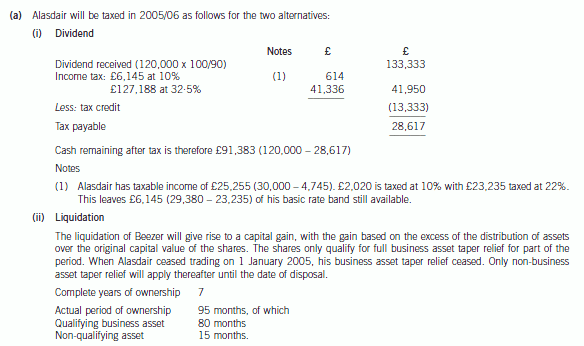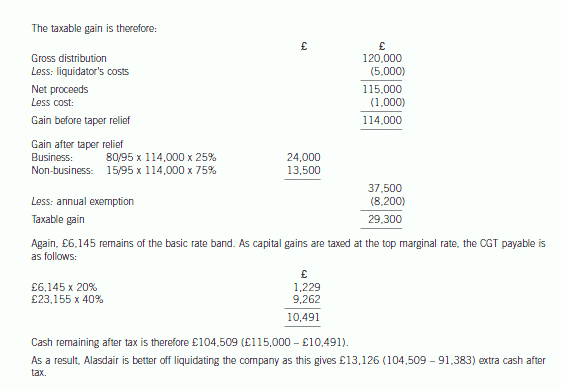目前是大四上,acca方向班的,已经申请了f1...
发布时间:2021-04-15
目前是大四上,acca方向班的,已经申请了f1到f5免考,已经交了免考费,大三想转到普通会计班,请问这对免考有影响吗?
最佳答案
在我看来是没有太多的影响的,这是国内本科学历教育与国际执业资格认证的结合,ACCA方向班采用全英文教材和中英文授课模式。具体是将ACCA的14门课程和会计学专业的本科培养方案进行整合,这也是适应经济全球化的一种很好的人才培养模式改革。
下面小编为大家准备了 ACCA考试 的相关考题,供大家学习参考。
6 Alasdair, aged 42, is single. He is considering investing in property, as he has heard that this represents a good
investment. In order to raise the funds to buy the property, he wants to extract cash from his personal company, Beezer
Limited, whose year end is 31 December.
Beezer Limited was formed on 1 May 1998 with £1,000 of capital issued as 1,000 £1 ordinary shares, and traded
until 1 January 2005 when Alasdair sold the trade and related assets. The company’s only asset is cash of
£120,000. Alasdair wants to extract this cash from the company with the minimum amount of tax payable. He is
considering either, paying himself a dividend of £120,000, on 31 March 2006, after which the company would have
no assets and be wound up or, leaving the cash in the company and then liquidating the company. Costs of liquidation
of £5,000 would then be incurred.
Since Beezer Limited ceased trading, Alasdair has been taken on as a partner at a marketing firm, Gallus & Co. He
estimates his profit share for the year of assessment 2005/06 will be £30,000. He has not made any capital disposals
in the current tax year.
Alasdair wishes to reinvest the cash extracted from Beezer Limited in property but is not sure whether he should invest
directly in residential or commercial property, or do so via some form. of collective investment. He is aware that Gallus
& Co are looking to rent a new warehouse which could be bought for £200,000. Alasdair thinks that he may be able
to buy the warehouse himself and lease it to his firm, but only if he can borrow the additional money to buy the
property.
Alasdair has a 25% shareholding in another company, Glaikit Limited, whose year end is 31 March. The remaining
shares in this company are held by his friend, Gill. Alasdair is considering borrowing £15,000 from Glaikit Limited
on 1 January 2006. He does not intend to pay any interest on the loan, which is likely to be written off some time
in 2007. Alasdair does not have any connection with Glaikit Limited other than his shareholding.
Required:
(a) Advise Alasdair whether or not a dividend payment will result in a higher after-tax cash sum than the
liquidation of Beezer Limited. Assume that either the dividend would be paid on 31 March 2006 or the
liquidation would take place on 31 March 2006. (9 marks)
Assume that Beezer Limited has always paid corporation tax at or above the small companies rate of 19%
and that the tax rates and allowances for 2004/05 apply throughout this part.


5 The directors of Quapaw, a limited liability company, are reviewing the company’s draft financial statements for the
year ended 31 December 2004.
The following material matters are under discussion:
(a) During the year the company has begun selling a product with a one-year warranty under which manufacturing
defects are remedied without charge. Some claims have already arisen under the warranty. (2 marks)
Required:
Advise the directors on the correct treatment of these matters, stating the relevant accounting standard which
justifies your answer in each case.
NOTE: The mark allocation is shown against each of the three matters
(a) The correct treatment is to provide for the best estimate of the costs likely to be incurred under the warranty, as required by
IAS37 Provisions, contingent liabilities and contingent assets.
(b) International Standards on Auditing (ISAs); and (5 marks)
(b) International Standards on Auditing (ISAs)
The groundwork for an international set of auditing standards began in 1969 with a number of reports published by the
Accountants International Study Group that compared the situation in Canada, the UK, and US. The establishment of the
International Accounting Standards Committee (IASC), in 1973, generated calls for a similar body to be set up for auditing.
In the late 1970s the Council of International Federation of Accountants (IFAC) created the International Auditing Practices
Committee (IAPC) as a standing committee of the IFAC Council. (Subsequently the IFAC Board.)
Tutorial note: The IFAC Council was renamed the IFAC Board in May 2000.
The first ISA was issued in 1991. The codified core set released in 1994, which has remained the series to the present day,
has been increasingly accepted by national standard setters and auditors involved in global reporting and cross-border
financing transactions.
In July 2001, IFAC sought comment on the role of IASC3 and the future of ISAs. As a result of the review, in 2002, the IAPC
was renamed the International Auditing and Assurance Standards Board (IAASB). IAASB has made available, on its website,
the full text of ISAs since 2003.
Further, the growth of non-audit assurance services has led to the development of a new framework (‘The International
Framework for Assurance Engagements’) effective for assurance reports issued on or after 1 January 2005.
The hope that the take up of ISAs should follow the lead set by International Accounting Standards (IASs), following their
endorsement by IOSCO (the International Organization of Securities Commissions), has been expressed by many professional
bodies including ACCA and FEE (the Fédération des Experts Comptables Européens). FEE has been leading the debate on
the future of ISAs in Europe since 2001.
ISAs provide for the international harmonisation of national standards and the adoption of a global framework approach. As
a member of CCAB (the Consultative Committee of Accountancy Bodies) ACCA is committed to consulting its members on
the adoption of ISAs in the UK, and working with FEE, the European Commission (EC) and others.
In response to the move in the profession, away from the ‘traditional audit risk’ model, to a business risk model, IAASB issued
ISA 315 ‘Understanding the Entity and Its Environment and Assessing the Risks of Material Misstatement,’ ISA 330 ‘The
Auditor’s Procedures in Response to Assessed Risks’ and ISA 500 (Revised) ‘Audit Evidence’. These standards (and
conforming amendments) are effective for audits of financial statements for periods beginning on or after 15 December 2004.
That is, they will be applicable to financial statements for periods beginning on or after 1 January 2005 that in the European
Economic Area (EEA) and elsewhere will be adopting International Financial Reporting Standards (IFRSs) for the first time.
The adoption of ISAs has been welcomed by professional bodies as providing a robust approach to risk, fraud and quality
control that is particularly important in the light of recent events (Enron/Worldcom/Parmalat). For example, ISA 315 provides
additional guidance on the assessment of risks of material misstatement at the financial statement level and at the assertion
level.
Tutorial note: Recent developments could validly be illustrated with reference to other standards. For example, ISA 240
(Revised) ‘The Auditor’s Responsibility to Consider Fraud in an Audit of Financial Statements’ that became effective from
1 January 2005 has raised auditor awareness of earnings management and the greater need for professional skepticism.
ISA 700 (Revised) ‘The Independent Auditor’s Report on a Complete Set of General Purpose Financial Statements’ is effective
for audits of financial statements for periods beginning on or after 15 December 2005. This proposed significant changes to
the auditor’s report to help promote consistency in reporting practices worldwide.
The International Organization of Securities Commissions (IOSCO) is in discussion with IAASB about the possible
endorsement of ISAs (similar to its endorsement of IASs).
Practicing professionals must keep themselves up to date on auditing standards if they are to provide quality audits. Failure
to do so could result in negligence claims and/or disciplinary action (e.g. by ACCA’s disciplinary committee). A survey by FEE
has demonstrated that the European accountancy bodies broadly comply with ISAs. However, an earlier survey4 of IFAC
member bodies showed that 14% had some significant differences (usually relating to reporting). IFAC needs to require its
member bodies to act rather than merely encourage implementation. A set of global ethical requirements will help improve
the implementation of ISAs as well as reduce the expectation gap in performing audits of financial statements.
声明:本文内容由互联网用户自发贡献自行上传,本网站不拥有所有权,未作人工编辑处理,也不承担相关法律责任。如果您发现有涉嫌版权的内容,欢迎发送邮件至:contact@51tk.com 进行举报,并提供相关证据,工作人员会在5个工作日内联系你,一经查实,本站将立刻删除涉嫌侵权内容。
- 2021-03-12
- 2021-01-01
- 2021-11-06
- 2021-04-17
- 2021-03-10
- 2021-03-11
- 2021-03-10
- 2021-05-11
- 2021-03-11
- 2021-06-05
- 2021-03-12
- 2021-03-10
- 2021-03-11
- 2021-02-11
- 2021-03-11
- 2021-06-05
- 2021-04-14
- 2021-03-11
- 2021-05-30
- 2021-06-08
- 2021-05-09
- 2021-06-04
- 2021-03-10
- 2021-02-15
- 2021-01-05
- 2021-03-11
- 2021-01-05
- 2021-01-04
- 2021-04-24
- 2021-03-11